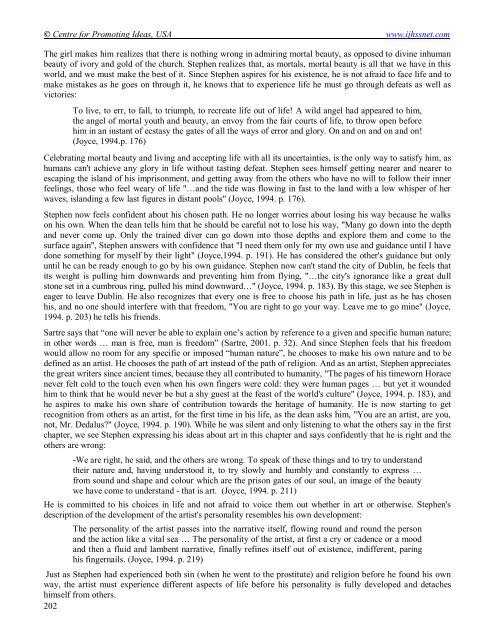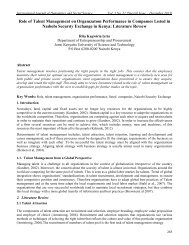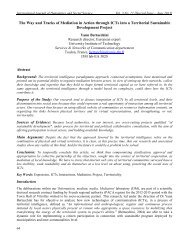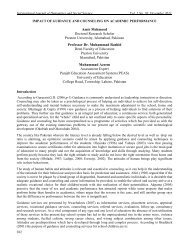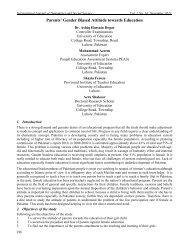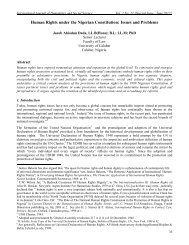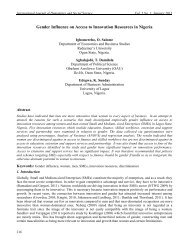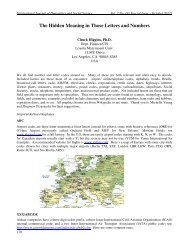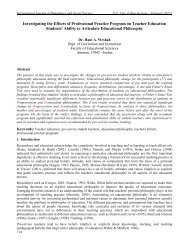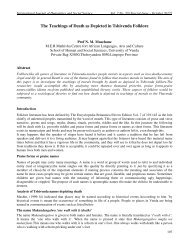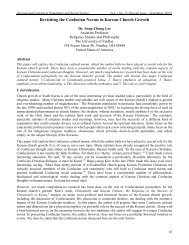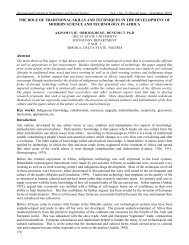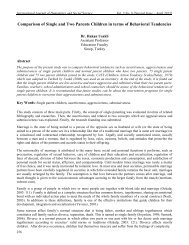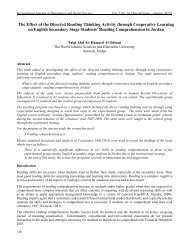The Portrait of Stephen as an Existentialist - International Journal of ...
The Portrait of Stephen as an Existentialist - International Journal of ...
The Portrait of Stephen as an Existentialist - International Journal of ...
Create successful ePaper yourself
Turn your PDF publications into a flip-book with our unique Google optimized e-Paper software.
© Centre for Promoting Ide<strong>as</strong>, USA www.ijhssnet.com<br />
<strong>The</strong> girl makes him realizes that there is nothing wrong in admiring mortal beauty, <strong>as</strong> opposed to divine inhum<strong>an</strong><br />
beauty <strong>of</strong> ivory <strong>an</strong>d gold <strong>of</strong> the church. <strong>Stephen</strong> realizes that, <strong>as</strong> mortals, mortal beauty is all that we have in this<br />
world, <strong>an</strong>d we must make the best <strong>of</strong> it. Since <strong>Stephen</strong> <strong>as</strong>pires for his existence, he is not afraid to face life <strong>an</strong>d to<br />
make mistakes <strong>as</strong> he goes on through it, he knows that to experience life he must go through defeats <strong>as</strong> well <strong>as</strong><br />
victories:<br />
To live, to err, to fall, to triumph, to recreate life out <strong>of</strong> life! A wild <strong>an</strong>gel had appeared to him,<br />
the <strong>an</strong>gel <strong>of</strong> mortal youth <strong>an</strong>d beauty, <strong>an</strong> envoy from the fair courts <strong>of</strong> life, to throw open before<br />
him in <strong>an</strong> inst<strong>an</strong>t <strong>of</strong> ecst<strong>as</strong>y the gates <strong>of</strong> all the ways <strong>of</strong> error <strong>an</strong>d glory. On <strong>an</strong>d on <strong>an</strong>d on <strong>an</strong>d on!<br />
(Joyce, 1994.p. 176)<br />
Celebrating mortal beauty <strong>an</strong>d living <strong>an</strong>d accepting life with all its uncertainties, is the only way to satisfy him, <strong>as</strong><br />
hum<strong>an</strong>s c<strong>an</strong>'t achieve <strong>an</strong>y glory in life without t<strong>as</strong>ting defeat. <strong>Stephen</strong> sees himself getting nearer <strong>an</strong>d nearer to<br />
escaping the isl<strong>an</strong>d <strong>of</strong> his imprisonment, <strong>an</strong>d getting away from the others who have no will to follow their inner<br />
feelings, those who feel weary <strong>of</strong> life "…<strong>an</strong>d the tide w<strong>as</strong> flowing in f<strong>as</strong>t to the l<strong>an</strong>d with a low whisper <strong>of</strong> her<br />
waves, isl<strong>an</strong>ding a few l<strong>as</strong>t figures in dist<strong>an</strong>t pools" (Joyce, 1994. p. 176).<br />
<strong>Stephen</strong> now feels confident about his chosen path. He no longer worries about losing his way because he walks<br />
on his own. When the de<strong>an</strong> tells him that he should be careful not to lose his way, "M<strong>an</strong>y go down into the depth<br />
<strong>an</strong>d never come up. Only the trained diver c<strong>an</strong> go down into those depths <strong>an</strong>d explore them <strong>an</strong>d come to the<br />
surface again", <strong>Stephen</strong> <strong>an</strong>swers with confidence that "I need them only for my own use <strong>an</strong>d guid<strong>an</strong>ce until I have<br />
done something for myself by their light" (Joyce,1994. p. 191). He h<strong>as</strong> considered the other's guid<strong>an</strong>ce but only<br />
until he c<strong>an</strong> be ready enough to go by his own guid<strong>an</strong>ce. <strong>Stephen</strong> now c<strong>an</strong>'t st<strong>an</strong>d the city <strong>of</strong> Dublin, he feels that<br />
its weight is pulling him downwards <strong>an</strong>d preventing him from flying, "…the city's ignor<strong>an</strong>ce like a great dull<br />
stone set in a cumbrous ring, pulled his mind downward…" (Joyce, 1994. p. 183). By this stage, we see <strong>Stephen</strong> is<br />
eager to leave Dublin. He also recognizes that every one is free to choose his path in life, just <strong>as</strong> he h<strong>as</strong> chosen<br />
his, <strong>an</strong>d no one should interfere with that freedom, "You are right to go your way. Leave me to go mine" (Joyce,<br />
1994. p. 203) he tells his friends.<br />
Sartre says that “one will never be able to explain one‟s action by reference to a given <strong>an</strong>d specific hum<strong>an</strong> nature;<br />
in other words … m<strong>an</strong> is free, m<strong>an</strong> is freedom” (Sartre, 2001. p. 32). And since <strong>Stephen</strong> feels that his freedom<br />
would allow no room for <strong>an</strong>y specific or imposed “hum<strong>an</strong> nature”, he chooses to make his own nature <strong>an</strong>d to be<br />
defined <strong>as</strong> <strong>an</strong> artist. He chooses the path <strong>of</strong> art instead <strong>of</strong> the path <strong>of</strong> religion. And <strong>as</strong> <strong>an</strong> artist, <strong>Stephen</strong> appreciates<br />
the great writers since <strong>an</strong>cient times, because they all contributed to hum<strong>an</strong>ity, "<strong>The</strong> pages <strong>of</strong> his timeworn Horace<br />
never felt cold to the touch even when his own fingers were cold: they were hum<strong>an</strong> pages … but yet it wounded<br />
him to think that he would never be but a shy guest at the fe<strong>as</strong>t <strong>of</strong> the world's culture" (Joyce, 1994. p. 183), <strong>an</strong>d<br />
he <strong>as</strong>pires to make his own share <strong>of</strong> contribution towards the heritage <strong>of</strong> hum<strong>an</strong>ity. He is now starting to get<br />
recognition from others <strong>as</strong> <strong>an</strong> artist, for the first time in his life, <strong>as</strong> the de<strong>an</strong> <strong>as</strong>ks him, "You are <strong>an</strong> artist, are you,<br />
not, Mr. Dedalus?" (Joyce, 1994. p. 190). While he w<strong>as</strong> silent <strong>an</strong>d only listening to what the others say in the first<br />
chapter, we see <strong>Stephen</strong> expressing his ide<strong>as</strong> about art in this chapter <strong>an</strong>d says confidently that he is right <strong>an</strong>d the<br />
others are wrong:<br />
-We are right, he said, <strong>an</strong>d the others are wrong. To speak <strong>of</strong> these things <strong>an</strong>d to try to underst<strong>an</strong>d<br />
their nature <strong>an</strong>d, having understood it, to try slowly <strong>an</strong>d humbly <strong>an</strong>d const<strong>an</strong>tly to express …<br />
from sound <strong>an</strong>d shape <strong>an</strong>d colour which are the prison gates <strong>of</strong> our soul, <strong>an</strong> image <strong>of</strong> the beauty<br />
we have come to underst<strong>an</strong>d - that is art. (Joyce, 1994. p. 211)<br />
He is committed to his choices in life <strong>an</strong>d not afraid to voice them out whether in art or otherwise. <strong>Stephen</strong>'s<br />
description <strong>of</strong> the development <strong>of</strong> the artist's personality resembles his own development:<br />
<strong>The</strong> personality <strong>of</strong> the artist p<strong>as</strong>ses into the narrative itself, flowing round <strong>an</strong>d round the person<br />
<strong>an</strong>d the action like a vital sea … <strong>The</strong> personality <strong>of</strong> the artist, at first a cry or cadence or a mood<br />
<strong>an</strong>d then a fluid <strong>an</strong>d lambent narrative, finally refines itself out <strong>of</strong> existence, indifferent, paring<br />
his fingernails. (Joyce, 1994. p. 219)<br />
Just <strong>as</strong> <strong>Stephen</strong> had experienced both sin (when he went to the prostitute) <strong>an</strong>d religion before he found his own<br />
way, the artist must experience different <strong>as</strong>pects <strong>of</strong> life before his personality is fully developed <strong>an</strong>d detaches<br />
himself from others.<br />
202


